The Myanmar public are not simply opposing the coup regime led by Min Aung Hlaing. They no longer view and accept what the Association of Southeast Asian Nations calls “the largest military force” in Myanmar.
Yesterday (17 April) was the Burmese New Year Day
“No Regime Change, No New Year (Celebrations),” is the single clearest message I picked up from surveying the social media during this year’s festive season. There are still photographs of eerily empty streets of my old Mandalay, angry curses against any Myanmar who would celebrate the water throwing festival, public pledges and calls not to celebrate Myanmar New Year.

In an unequivocal manner, several million residents of Mandalay deliberately stayed home and turned their city ghostly and desolate on the Eve of the Water Festival.
I also glanced at the deserted scenes of a famous pagoda compound in the ancient city of Taungoo (below) while listening to a popular theme song from one of the most memorable New Year films at all times called Thin Gyan Moe (or New Year Rain) made in the dying years of the first military dictatorship of General Ne Win (1980’s). (Watch the original grainy clip from the star-studded classic Water Festival film set in Mandalay in the last decade of the first military dictatorship under General Ne Win: Thin Gyan Moe. Vocalist and actor the late Zaw One of Mandalay, with May Than Nu.)
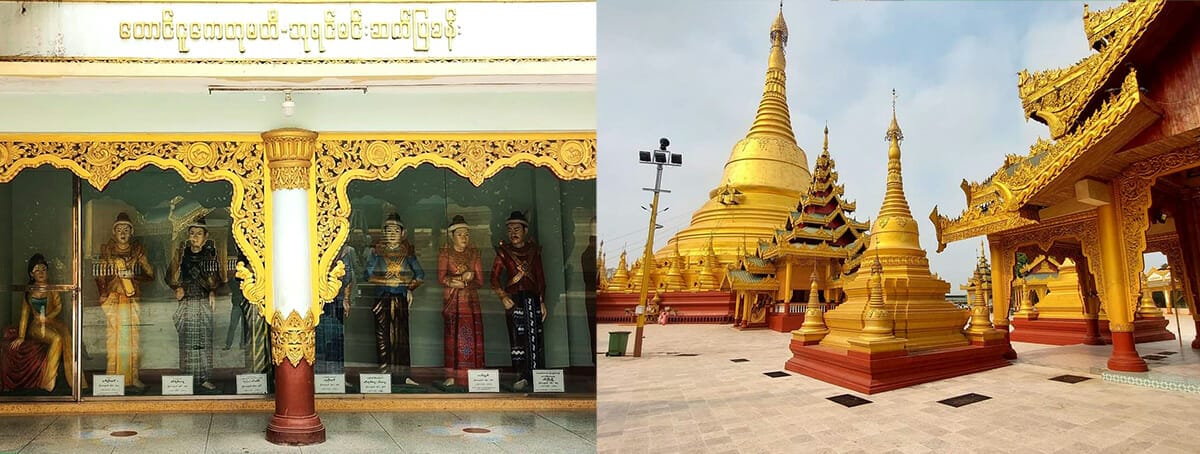
Buddhist temples and pagodas are typically places where the pious among the public would go for merit-making. The public abandoned this temple in the ancient city of Taungoo, a half-way between Yangon and Mandalay. (pictures: screengrabs from Facebook post, 16 April 2023).
Mandalay is known as the country’s most exciting centre of the New Year celebrations. Typically, throngs of merrymakers of all ages, faiths and sexes who would fill the city’s broad streets along the moat that surrounds the old, fortified palace ruins are nowhere to be seen. That is, except in one or two coup regime organized festival pavilions.
Mandalay Zaygyo or market and its iconic clock-tower (circa. 1970’s).
Photo in the author’s possession.

The coup-regime organized venues for the New Year celebrations were shunned completely by the overwhelming majority of Mandalay residents, 16 April 2023. (screengrab from Facebook).
A cultural backgrounder may be in order …
We call the Burmese New Year Thin Gyan Festival (or the Festival of Change). Thin Gyan is the Burmese term derived from its Sanskrit root (Sin Gan Da), meaning change. Importantly, the seat of the old Burmese culture since its founding in 1850’s, Mandalay is the most popular destination for musicians, artists, celebrities and so on from other parts of the country to descend.
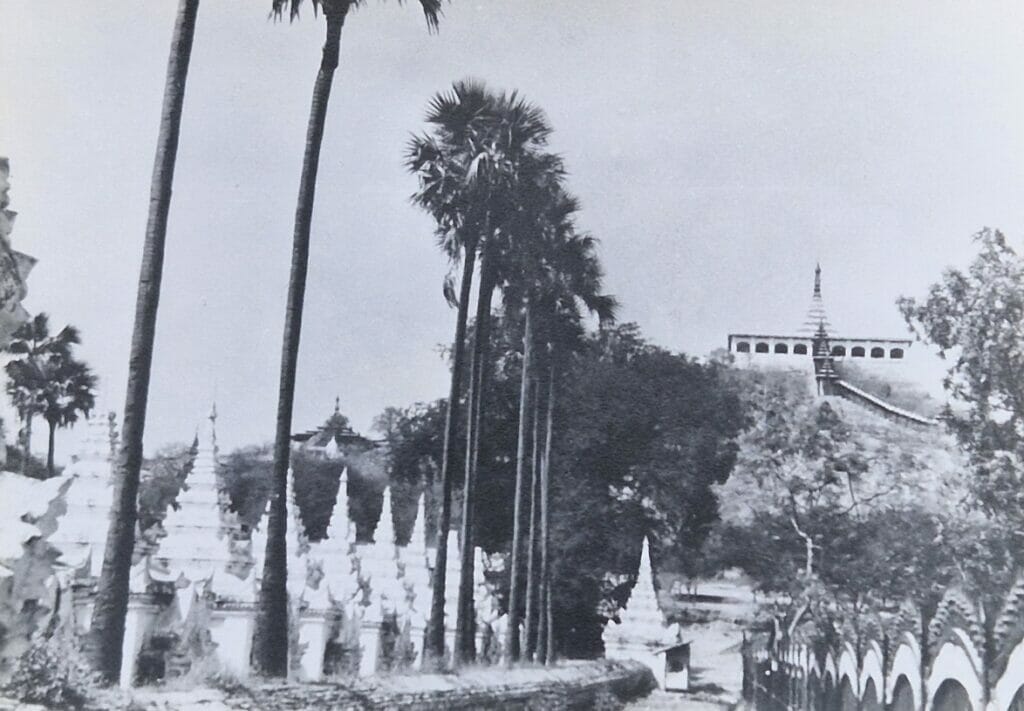
Mandalay Hill at the foot of which was a popular destination for Water Festival participants for lunch time rest. Circa. 1970’s (picture in author’s possession).
Like Christmas seasons in the predominantly Christian West of Europe and N. America, signs of preparations for festivities are everywhere, weeks before the Thin Gyan. Everyone, still capable of excitement and joy, feels the bubbly feel of anticipation. For the approaching old year, transitioning to a new, and better year, and the fun-filled acts of water-throwing as well as dancing and singing along LIVE dance and musical performances throughout the city. There is also this ancient tradition of public airing of social and political criticism directed at individuals and institutions of power who are deem having failed to uphold the virtues of justice, fairness and compassion or Dharma.
During the Thin Gyan, people of all classes, faiths, and ages throw water at one another as an act of popular ritual. For 3 days, and nights, communities indulge themselves in dance and music, and intoxicants (in lepra, the festive period is extended to 4-days).
Then there is boisterous music from neighbourhood bands and the joy-filled, if loud, teases, as festival-participants – which was everybody except senior monks, firefighters, police and lay Buddhists who were on sabbath – occasionally shout at one another.
Thin Gyan is generally a period of public display of tolerance towards playful behaviour or words that generally are “taboos”. And equally important, criticisms directed at individuals and institutions of power and influence are integral to the New Year customary practices. (See here for a sample of the time-honoured tradition of airing typical political satires.)
Against this psychocultural backdrop, the majority of Mandalay’s people – and other communities across the country – have chosen to deny themselves a communal joy of ushering in a New Year, two years in a row since the 1 February coup.
Here is how a typical New Year festival in Myanmar might look:
However, significantly, the widespread boycott and the main substance of the increasingly strident satirical criticisms via Facebook LIVE reinforces what I have argued in my Washington Post opinion editorial The Myanmar military is destroying its public image. Politics won’t be the same (https://www.maungzarni.net/mm/node/890) two years ago: there no longer exists the emotional bond between the Tatmadaw or the military and even the predominantly Burmese ethnic majority. The Dry Zone ethnic Bama heartlands supplied the institution with the largest number of recruits, officers and privates.
The Dry Zone (or A-nya) such as Saggaing, Magway, and Mandalay peoples have not only turned their back on the military but also witnessed the fiercest armed resistance and civil disobedience movement.
The coup regime is in deep trouble, despite its well-stocked arsenals. Min Aung Hlaing and the Tatmadaw has lost its most important base – the majoritarian ethnic Bama and Buddhist society.
There are certainly exceptions to this general boycott as can be seen from the Facebook posting of the Eleven Media Group below.

Screenshot of the Facebook page of Eleven Media Group.
Kanbawza is a military-crony-owned business run by a long-time crony named Saya Kyaung. And Eleven Media was notorious as a racist platform popularizing and peddling fear and hatred of Rohingya and Islamophobia during the 2010’s leading up to the genocidal campaigns of 2016 and 2017.

Like Irrawaddy News Group based in Chiang Mai, Thailand, the Eleven Media Group was one of the potent hate- and Islamophobia-peddling Myanmar language media outlets during the 2016 and 2017 genocide of Rohingya by Myanmar military.
A cursory glance at the old genocidal media outlet indicates it is trying to promote the image of Myanmar as a normal, peaceful country where people just go about their daily lives, despite the fact that the country has plunged deeper into the abyss of civil war. The 11 April New Year Eve airstrikes in Saggaing region is just one of hundreds of incidents of the military-sponsored slaughters.
These New Year satirical songs reflect accurately Myanmar’s popular sentiments of rage and deep revulsion towards the once respected national institution founded as an instrument of national liberation from foreign colonial rule.
One song even chastised Aung San Suu Kyi, now in captivity, for calling the military “my father’s army”, with “genuine affection”. Besides, the preforming satirists proclaimed the death of the military as an anti-Fascist resistance people’s force as early as 1958, the year of the 1st undeclared coup made to look like a Constitutional transfer of power from democratically elected Prime Minister U Nu to the Commander-in-Chief General Ne Win.
We live in an age where the ideology of democracy – if not the actual practice – has triumphed over all other ideological orientations. So much so that even the world’s most repressive regimes evidently feel compelled to engage in the charade of elections while adopting the trappings of a democracy, albeit with pre-ordained electoral outcomes.
Examples abound …
The Chinese Communist Party and its “elections” which resulted, among other things, anointing Xi Jinping as Chairman with no term limits; India’s BJP government headed by PM Narendra Modi has been dubbed Hindutva or Fascist; Thailand’s hybrid military-feudal complex of General Prayut and its election next month; Cambodia’s regime headed by the autocratic ruler Hun Sen (in power for nearly 30 years); and Myanmar’s coup regime of Min Aung Hlaing who presided over Rohingya genocide.
In the case of Myanmar today, it is crucial to fully grasp this fact:
Myanmar public are not simply opposing the coup regime led by Min Aung Hlaing. They no longer view and accept what the Association of Southeast Asian Nations calls “the largest military force” in Myanmar.
Without any material support from external actors, the ethnic majoritarian Myanmar’s two-years old armed resistance movement may not win the Zero-sum fight against this well-armed military of genocidal killers. Besides, Min Aung Hlaing regime is, “in effect, financed by multinationals even from Western democracies including USA, Australia, UK and Canada”, as my colleague Sai Latt wrote in Myanmar Now.
The UN agencies are also rightly accused of collaborating with the regime and providing semblance of normalcy, acceptance and international legitimacy.
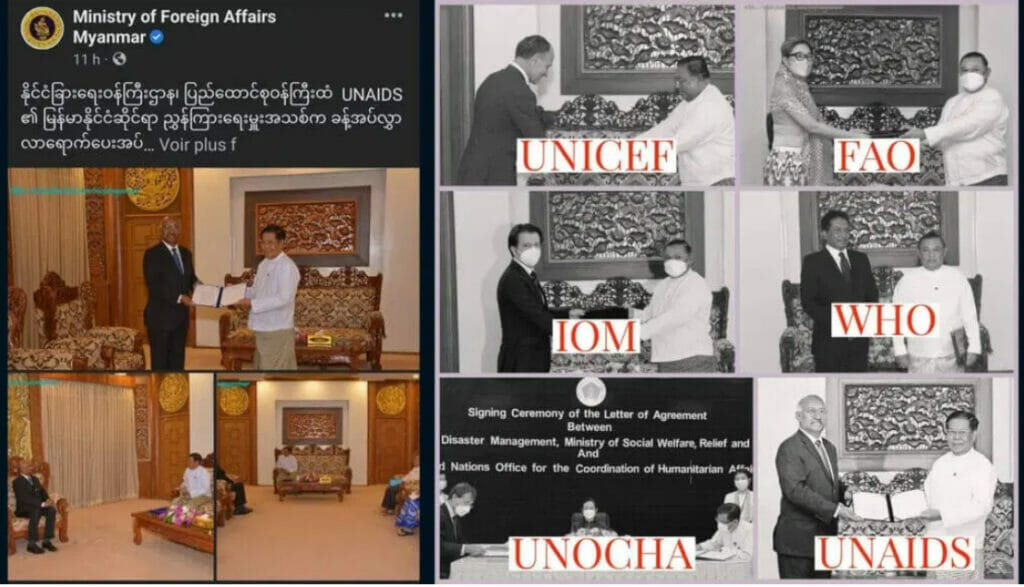
And the situation in Myanmar may eventually end up being a protracted draw, with devastating long-term consequences for the country.
Obviously, the country’s immediate neighbours such as Thailand, India, China, Laos and Bangladesh are not really concerned that the civil war – that is the term – in Myanmar will pose any serious problems for them. Beyond lip service, if at all, the neighbours do not really care that millions of Myanmar people are in a living hell on earth. The regime spokesperson Zaw Min Htun spoke about the dire economic situation since Covid-19 pandemic days while the 45-page leaked secret document from the regime’s meeting of intelligence and security chiefs noted the thousands of incidents of sabotage, violence and extrajudicial killings throughout most regions of Myanmar.
Bangladesh which has borne the brunt of Myanmar’s genocide and resultant 1 million “forcibly displaced people from Myanmar”, is fixated on the repatriation of Rohingyas, a pipe dream without the “regime change“ in Naypyidaw.
Thailand’s military leadership seem to believe they can either push back the war-fleeing Myanmar refugees across the boundary rivers or just build some temporary shelters for the latter while maintaining the business-as-usual ties with the perpetrators in power. India’s sole concern is to maintain its toehold in Myanmar vis-à-vis its nemesis China.
As Sai Tun Aung Lwin argues in his FORSEA op-ed, the Chinese Communist Party leadership appeared to have decided that it can protect its strategic and trade corridors as well as sovereign assets such as the twin gas-and-oil pipeline by keeping under Beijing’s sway a handful of ethnic armed organizations such as the Arakan Army, the Kachin Independence Organization, the United Wa State Army, etc. and unconditionally backing the nationally reviled Myanmar military regime in Naypyidaw.
But make no mistake …
Myanmar is now undergoing a full-blown civil war to an unprecedented degree.
The populations in Myanmar are no longer prepared to continue to be abused, violated and otherwise misruled over by the genocidal military. They will not reconcile with their perpetrators, without justice and freedom. As the Burmese historian Tharaphi Than argued in her 15 April-dated analysis in The Conversation, neither the coup regime nor the majoritarian Burmese armed resistance can and will quit.
On its part, Min Aung Hlaing’s coup regime, sinisterly labels anyone and any community that publicly expresses pro-democratic sentiments as “terrorists”. The regime has singled out even pro-democracy civilians, including children and women as “terrorists and their sympathisers and supporters”, hence “legitimate targets.”
In his 15 April interview on Talk to Al Jazeera, the regime spokesperson Major General Zaw Min Htun likened Myanmar’s anti-coup resistance groups with “terrorists” in the Middle East and their local communities. As if borrowing a twisted logic which Israel routinely airs after IDF’s air strikes against civilians or demolished Palestinian homes in the Occupied Territories of West Bank and Gaza, Zaw Min Htun told Tony Chen, the interviewer, bombing a concert in ethnic Kachin area of Hpar Hkant, Northern Myanmar, or the ethnic Chin state town called Htan Ta Lan in Western Myanmar, was justified because the civilians who gathered were all “terrorist supporters”, though they may be civilians.
The late dictator General Ne Win’s grand-son Khway Ne Win took to Tik Tok airing his victim-blaming narrative. To the outrage of Myanmar public, he justified the coup regime’s airstrikes against civilian gathering in Saggaing Division on 11 April, that is, 3 days before the country entered the New Year festive period. He said he holds the anti-coup resistance organizations responsible for the death of 165 civilians including a few dozen children.
In Khway Ne Win’s own words, “these terrorist groups deliberately gathered civilians and provoke the national armed forces to attack them.” He is a known supporter of the coup and a financier of the genocidal “Buddhist” nationalist network during the military’s genocide against Rohingyas.
Myanmar people can fully understand and appreciate the depth of the seething a hatred, rage and revulsion they/we feel towards Myanmar’s coup junta and the Tatmadaw or the armed forces. They know that their formerly national armed forces have been instrumentalized, not for national defence or protection of the population, but for terrorising the defiant populations into administrative submission, and for perpetuating the military dictatorship.
But this regime-sponsored terror campaign is clearly not working.
The resistance fighters have vowed to step up their counter-offensives while the unarmed dissidents call for making local communities absolutely “ungovernable.”
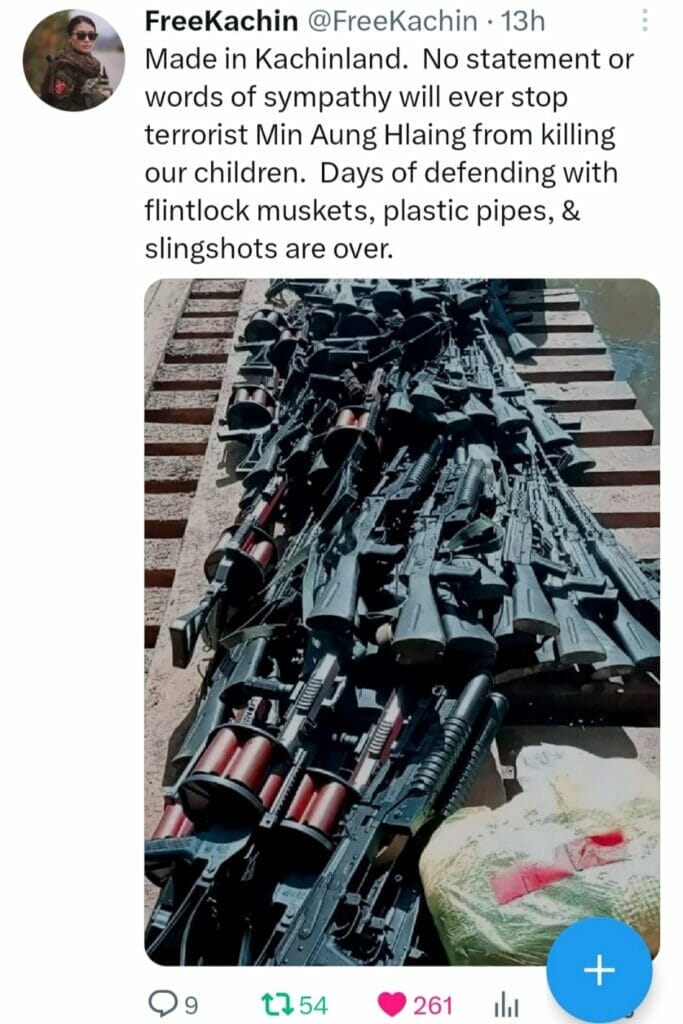
Since the coup of February 2021, Min Aung Hlaing regime, by its own admission made by its spokesperson on AJE interview, is unable to control more than half-the-country: out of a total of 330 administrative units (townships, that is), the regime is able to administer less than 190 units.
Still, the regime is bent on proceeding with its sham election. The regime spokesperson Zaw Min Htun repeated his boss Min Aung Hlaing’s pledge to “restore democracy” through yet another military-sponsored elections later this year. The regime is trying to soften its international image, with the coup leader presenting himself as “Prime Minister”.
Who from Time magazine thought this was a good idea to place #MAL as one of the 100 most influential people?? Talk about tone deaf – this guy is a criminal and responsible for innumerable atrocities 🤯 https://t.co/ItvCRiuVFz
— Manny Maung (@mannymaung) April 14, 2023
With the help of TIME and other media outlets, the generals and their main spokesperson Major General Zaw Min Htun are busy reinventing themselves the custodians of democracy. They appear now in their civilian attire, swapping their green uniform with national attire, which is Indian sarong or longi and Chinese jacket, for propaganda purposes.
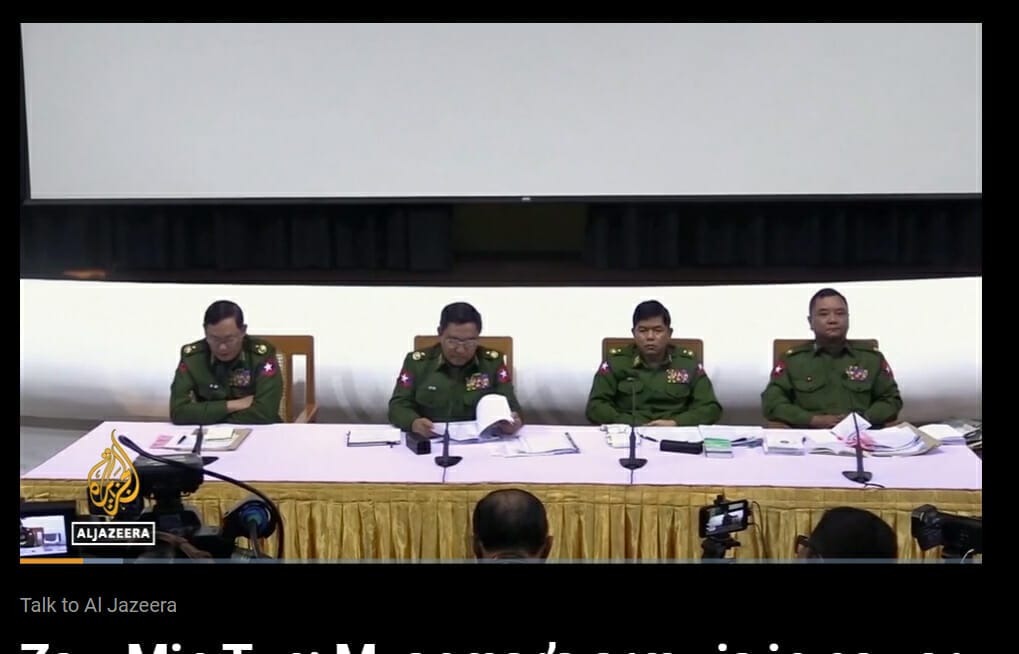
Major General Zaw Min Htun at a local press conference (Far Right).
International diplomats, UN officials and other state functionaries may prefer “inclusive dialogue” with Naypyidaw’s genocidal leaders to a people’s revolution, even though the generals-cum-genocidaires keep on killing even civilians with impunity. For the genocidal leaders believe they cannot be touched, with backing from Russia and China, in an increasingly polarized world order. Then there is little wonder that Myanmar public’s sentiments against any type of dialogue have only hardened.
Yes, all wars end at the dialogue table, but only after the aggressors are overpowered to stop the killings or felt the need to seek an exit for survival.
In so far as Myanmar public is concerned Min Aung Hlaing and the coup leaders are dead men walking. So far, Myanmar’s genocidaires in green uniform are shooting their way out, from the air and on the ground.
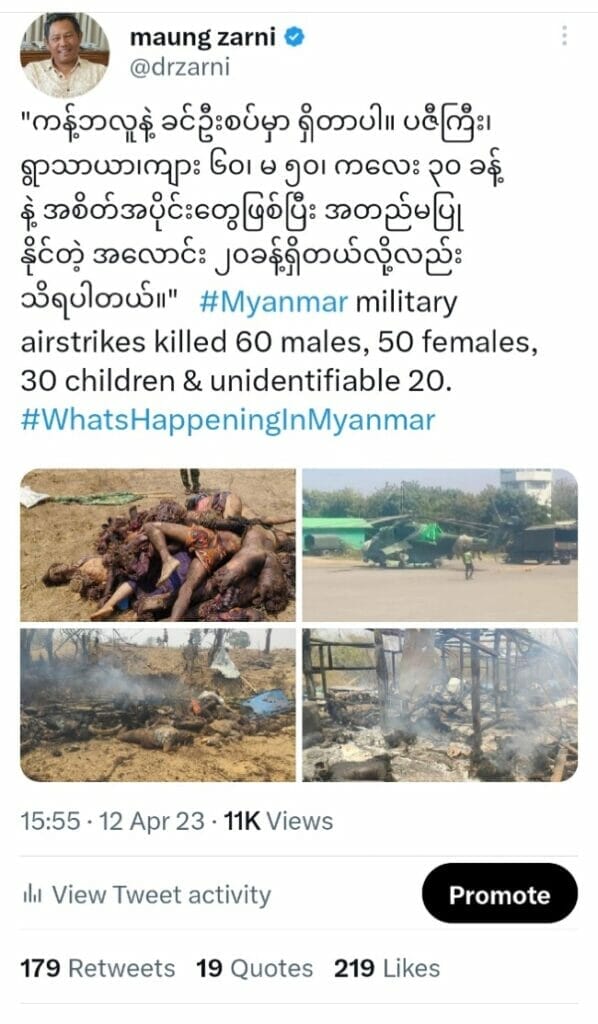
No amount of mediation will placate the society that has come to view, with good reason, its national armed forces as a Fascist-like occupier.
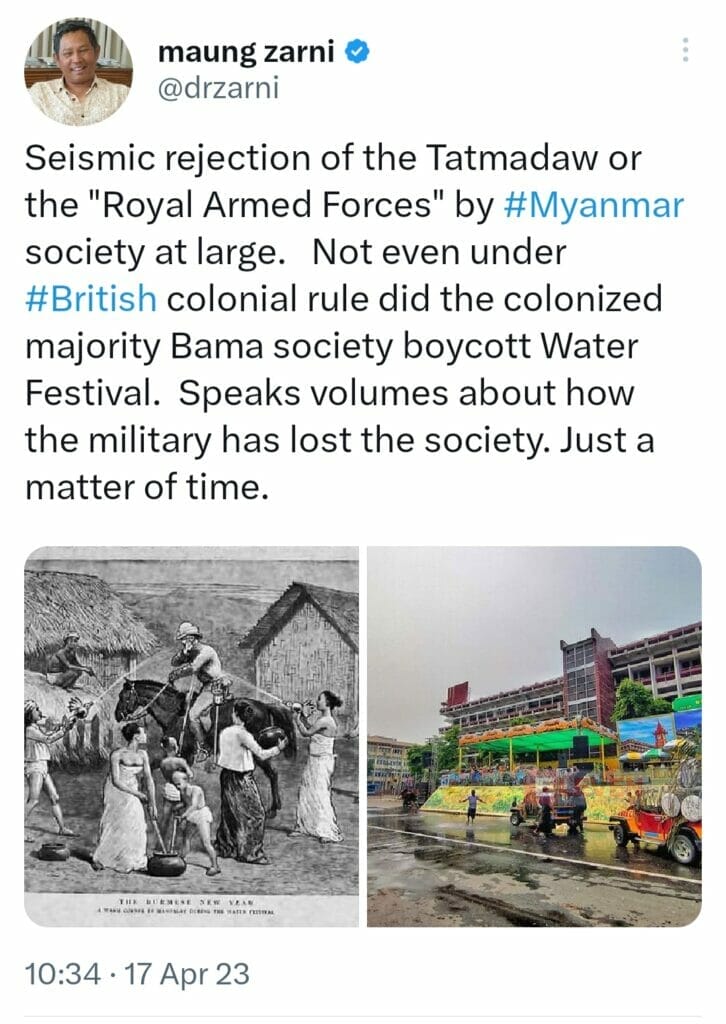
Neither the regime’s elections nor the Security Council’s ineffectual discourse of “inclusive dialogue”, has any taker among Myanmar’s majoritarian Burmese resistance. Certainly, not after the regime’s airstrikes slaughtered 160 civilians, including 30 children in the Burmese Buddhist heartland of Saggaing.
Maung Zarni

